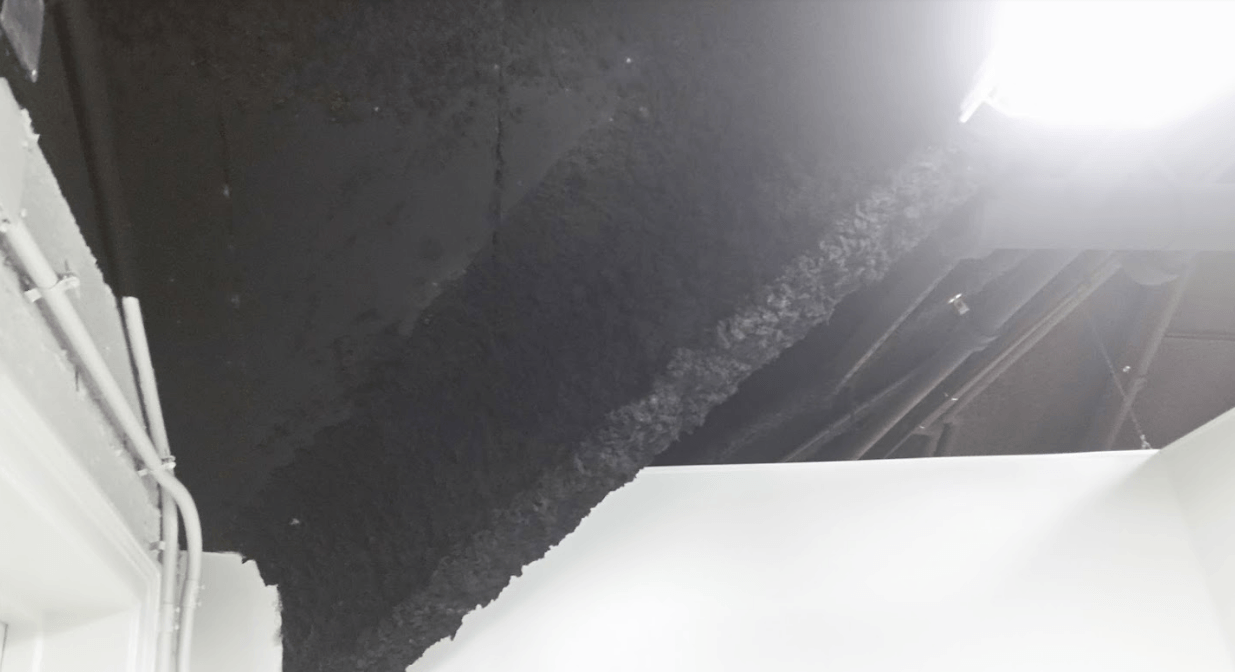Attic of Lee Hall, used for student leadership offices, poses health risks
5 min read
Alex Sakes | The Blue & Gray Press
By ESTER SALGUERO & IZZY BRIONES
For four years, members of the Honor Council and Judicial Review Board have had to tolerate the unsafe conditions of their offices in the attic of Lee Hall. The ceilings of the office are unfinished and covered with foam insulation, which is known to be hazardous to a person’s health. For that reason, attics are primarily used as storage space, but this is not the case in Lee Hall where the attic has been turned into a makeshift office for students.
In addition to the health concerns these offices pose, the doorway leading to the fire exit is faulty and locks students in unexpectedly, which is a fire hazard. At times the elevator does not work, leaving these students at risk and with the thought that if a fire were to occur it would be hard to escape or that they might not make it out in time.
Honor Council president Jackie Khawand, who is a senior, said that the offices have been in use since she was a freshman and that the president before her would warn prospective Honor Council members of the ‘sketchy’ conditions.
“I feel uneasy being up here because I have concerns for my health and for my safety regarding the fire hazards and the health hazards,” Khawand said.
Senior international affairs major Molly Miller works in the offices in Lee Hall along with Khawand. She shares similar fears about her health when it comes to the concerns that the offices pose.
“I don’t feel comfortable in an environment with no functional emergency exit, which is why I only work in the office if it is absolutely necessary,” Miller said. “The insolation in the ceiling is exposed to the room, so I have no idea what kind of chemicals I’m being exposed to when I’m working there.”
The Honor Council members have gotten into the habit of going to their office in pairs because of the concerns and fears of getting locked into the attic.
“I kind of have taken the initiative to come up here by myself, but it is scary,” Khawand said. Khawand’s father is an infectious disease physician and has visited her office before. Her father’s initial reaction to the conditions was sock and even advised her to wear a mask to work every day to prevent any long-term respiratory problems.
The offices have been in use since 2008, according to Khawand, but they are not suitable even for practical matters, such as using the computer, because the Wi-Fi connection does not work. “If I wanted to work up here on Honor Council related stuff I wouldn’t be able to,” Khawand said.
As President of the Honor Council, Khawand is required to use Maxient, software used to report and document behavioral records, which are to be maintained confidential. However, it is impossible to do work in the office because there is no internet access and there are no private quarters for Khawand to use on-campus.
Khawand works up to 15 hours per week, excluding hearings, on Honor Council related business. She finds herself looking for spaces to use in the University Center or in the Hurley Convergence Center but these locations simply do not provide her with the privacy she needs. She would like to use her office in Lee Hall for office hours but is unable to because of the lack of internet access.
“I would like to spend those hours up here because it is a very closed off space,” Khawand said, “but the conditions of the office are unsafe and the internet connection is unavailable from the attic.”
Dr. David Rettinger, Executive Director of the Center for Honor, Leadership and Service, has made his office available to Khawand whenever she may need it. It is located on the third floor of the UC, but she really desires a space of her own for the Honor Council.
“I feel that the Honor Council office is entirely inadequate for the work that we do,” Miller said. “We work with sensitive information, and we meet with students who are in tough situations, but we have no acceptable space to call our own in which to host these meetings.”
Recently, Khawand has invited Dr. Juliette Landphair and Rettinger to visit the office so that they can see the conditions for themselves because students are the only people who use those offices.
Landphair has said that she would go up to the attic to check the conditions of the office and see what could be done for them, according to Khawand.
“She has told me that she is willing to come up here, look at the conditions and then see if there are any options on campus for us to move somewhere,” Khawand added. “So the administration is working with us but this is something that has been going on for a super long time.”
Khawand wishes to have an office to hold weekly meetings in and to have the option of giving student advisors the ability to join their advisees during private conferences in a space that protects the confidentiality of the students.
“My work days are a little bit thrown off because you know I can’t come up here or I don’t feel safe coming up here,” Khawand said.
As a student living off campus she would prefer an office space on campus where she is promised confidentiality because of the records that she deals with and their need to be kept private.
“Since I am a commuter it is kind of hard for me to go home randomly throughout the day,” Khawand said.
Both the HCC and UC are options she has considered. However, the walls are made of glass panels and that makes students uncomfortable when they have to meet with her for sanctions involving violations of the honor code. The meeting rooms in the HCC are known for their pervious walls that are far from being soundproof. But these options are not suitable for the Honor Council’s needs and requirements when it comes to needing a private area to hold appeals.
“A lot of people who are accused of a violation want to keep it as secretive as possible,” Khawand explained.
When the UC was being constructed, the previous Honor Council president was notified that they would receive an office, however the office spaces were filled and there was nothing left over for them.
“I would like to find a long term solution, for the future of the council and for the health of the council,” Khawand said.
This past Friday, she submitted a report about her concerns of the safety of the offices to the Board of Visitors on behalf of the Honor Council.
“They were unaware of all the hazards our office presents and insisted on helping us work towards a solution,” Khawand said.
She requested that the fire door to the stairwell remain unlocked and that the office be thoroughly cleaned.
“My goal for the future is to find a more accessible office space,” Khawand said, “so that the Honor Council is more of a consistent presence on campus, rather than being hidden away in the Lee Hall Attic.”












Agreed; reliable exits in case of a fire are vital, literally. That said, please do not even TRY to take an elevator in the event of a fire plz. It’s on like every elevator ever everywhere. Just wanted to say that in response to the second paragraph.